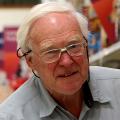
SUCH a shame that John Betjeman is still not around. Following the silencing of Big Ben, the BBC is poised to “celebrate bells around the UK”.
For Betjeman, of course, bells, especially church bells, were the soundtrack of his life. He titled his autographical poem “Summoned By Bells” and in a shorter poem he urged: “Let’s praise the ringers in the tower/ Who come to ring in cold and shower.”
His bells usually signalled joy. Never more so than in what I consider one of his finest pieces of prose. It’s a profile of the Wiltshire town of Highworth, which he introduces as the town he always recalls as the most typically English when he is abroad. He describes a summer evening walk around the town, at the end of which he hears “a sound of tea being cleared away in a cottage near us. And suddenly, with a burst, the bells of Highworth church rang out for Evensong. As though called by the bells, the late sun burst out and bathed the various roofs with gold… Sun and stone and old brick and garden flowers and church bells. That was Sunday evening in Highworth. That was England.”
Superb. And yet arguably Betjeman’s most telling lines on bells strike a sombre and chilling note: “The tasteful crematorium door/ Shuts out for some the furnace roar,/ But church bells open on the blast/ Our loneliness, so long and vast.”
Agreeing to broadcast “around next Christmas” the bells of Rochdale town hall, which resemble Big Ben’s, if not as sonorous, the director general of the BBC, Lord Hall, said: “There might be potential for us to feature the bells of the nation in other ways.”
I have my own special ‘bells’ memory. The house on the Eston Hills where I grew up was almost one-and-a-half miles from Ormesby parish church, which has a fine peal of bells. But very occasionally they could be heard at our home, the sound having carried over fields and woods. It was truly bells across the meadows, and more than once my parents, non-churchgoers, stood in the garden to listen.
Yes, it’s an initiative very typical of the BBC to consider showcasing the nation’s bells in some way. Unthinkable by most broadcasters, such ideas are the stuff that leads to the kind of programmes that – still – mark out the BBC as the best broadcaster in the world.
HOW sad. After caring for their much-loved landmark, the White Horse, for 161 years, the local volunteers of the Kilburn White Horse Association are being more or less compelled to pass the role to the Forestry Commission, whose land the horse occupies. The handover is all very polite and mutually complimentary. But it’s a particularly depressing instance of the baleful effects of “health and safety”.
No doubt the Commission is worried about the implications of an accident on the horse. But it is a huge shame if this means stifling a shining example of a community willingly, even eagerly, doing a job for themselves – incidentally giving great pleasure to many others – rather than expecting some agency to do it for them.
Kilburn villagers created the horse and have always (lovingly) cared for it. A way should be found to allow them to continue.



Comments: Our rules
We want our comments to be a lively and valuable part of our community - a place where readers can debate and engage with the most important local issues. The ability to comment on our stories is a privilege, not a right, however, and that privilege may be withdrawn if it is abused or misused.
Please report any comments that break our rules.
Read the rules here